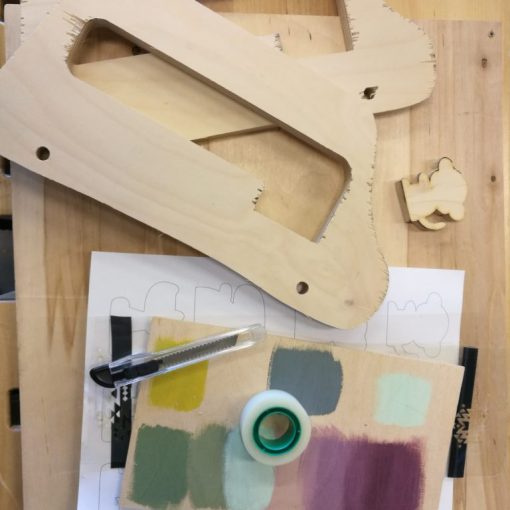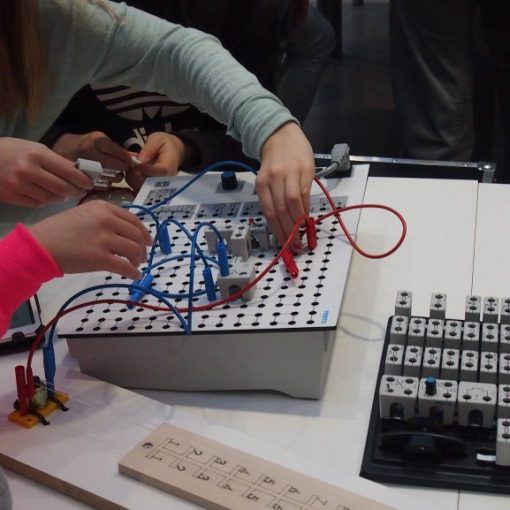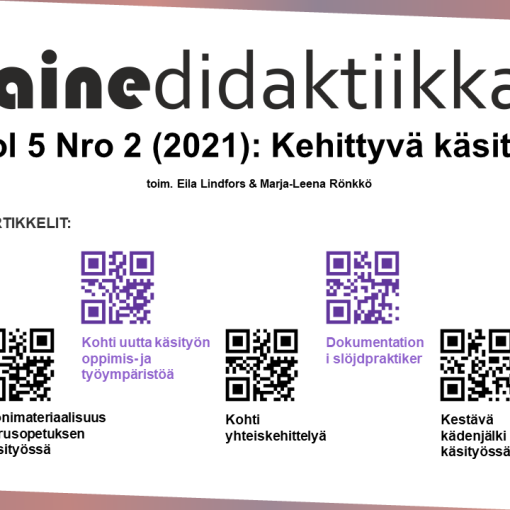Redesigning school environment @Innokomp
Noora Salonen & Tellervo Härkki
Department of Education, University of Helsinki
A new service-design oriented craft project model that was piloted at Helsinki, Finland, set pupils, teachers and student teachers in new challenging roles. Pupils were tasked to discover and redesign non-functional areas from their school, which is one of the oldest Finnish school buildings still in operation. The main aim was to engage and empower pupils to see themselves as experts of their own life and everyday environment, as well as capable of designing and bringing in change into their own and their peers life. This project was part of program Innokomp, a Finnish initiative that develops pedagogical models for craft education. In Innokomp, not only pupils but also teachers and student teachers are learners, and teachers collaborate closely.
Two enthusiastic and open-minded craft teachers, with the help of an external service designer and a researcher, guided pupils through early phases of co-ideation and co-designing, and later, through co-making of prototypes. While one of the teachers taught new techniques (drilling, welding, 3D-printing, etc.) to pupils, the other one ensured overall progress. Student teachers faced a role very different than in previous practicums: pupil-centred projects proceeded in their own pace and to their own directions. Student teachers and teachers could do very little pre-planning, and the main task for student teachers was to motivate and encourage groups to divide labour and to overcome obstacles. According to end interviews, one of the most important learning outcomes was how to work with others. As a whole, the experience was demanding but rewarding.
Discover and make projects @Innokomp: A case example
Tellervo Härkki & Auli Saarinen
Department of Education, University of Helsinki
Learning at school is not a privilege reserved for pupils only. A Finnish programme designed to develop pedagogical models for craft education introduces a concept with ambitious discover and make projects to pupils at elementary schools. Additionally, it caters for teachers as well as teacher students entering their third (and penultimate) practicum period. This national-level program Innokomp provides pedagogical tools and models for teachers to refresh their craft teaching competence in co-operation with their colleagues. Further, student teachers get experience of novel approaches.
The core elements of the program include phenomenon-based projects, pupil-centred collaborative discovery and making, and digital modelling. In these projects, pupils work at groups, which is novel for craft education. Textile craft and technology teachers are encouraged to work closely as a team in all phases of planning, teaching and evaluating; another novelty. Typically, several student teachers practice in one project. All in all, peer learning and collaboration occurs at three different levels: pupils, teachers and student teachers and in all directions.
Pupils, teachers and student teachers face different learning challenges in each school and in each project. In this particular elementary school, craft teachers have a long shared history; yet collaboration at this level is new. This year is the second time when 5th and 6th grade pupils innovate and create games, and the first year when 6th graders discover and prototype technological solutions to everyday problems. Feedback from the school tells that the projects are fun, exiting, rich and intense experiences.
Co-teaching as a way to enhance students’ pedagogical innovation processes
Sofia Krapi, Eila Lindfors & Marja-Leena Rönkkö, Department of Teacher Education,
Rauma campus, University of Turku, Finland
Co-teaching is a method in which craft teachers implement multi-material craft teaching in collaboration. Main elements of co-teaching are co-planning of teaching, co-defining a learning tasks, practical teaching and tutoring of students in makerspaces and evaluation of learning outcomes and management of co-teaching. The aim of this study is find out how co-teaching supports students’ innovation processes. The research question is: What are the challenges of co-teaching in enhancing students’ pedagogical innovation processes in comprehensive education? Research is a qualitative multi-case study. The research material will be collected as group interviews. The respondents are 10 pairs of co-teaching student teachers (n=20) in their final teaching practice at master level and craft teachers (n=22) who started to develop co-teaching as part of the InnoKomp-project since 2017. Teachers and students participate in the interview together as co-teachers. The result will be presented on the basis of a theorydriven analysis. Results unfold challenges teachers meet as beginners, advancers and professionals in co-teaching. The results can be applied in pre- and in-service teacher training. Co-teaching seems to be one solution to enhance students’ pedagogical innovation processes in a way that different learners can have timely support during their process.
Keywords: co-teaching, craft, pedagogical innovation processes, interview
Nordisk forskningskonferens i slöjd 17-20 september 2019
Make&Learn vänder sig främst till forskare och lärare vid universitet och högskolor inom slöjdområdet i de nordiska länderna. Konferensen är även öppen för deltagare från andra slöjdverksamheter där man bearbetar material med hjälp av olika redskap till fysiska föremål. Konferensspråk är skandinaviska språk och engelska.
Konferensen äger rum 17-20 september 2019 på HDK i centrala Göteborg. Under dagarna ges möjlighet att besöka Nääs gamla Slöjdlärarseminarium.
Konferensen arrangeras av HDK i samarbete med den nordiska organisationen Nordiskt forum för Forskning och utvecklingsarbete inom utbildning i slöjd (NordFo) som verkar för slöjdrelaterade samarbeten mellan de nordiska länderna.




